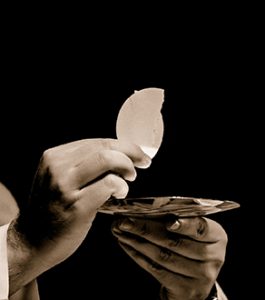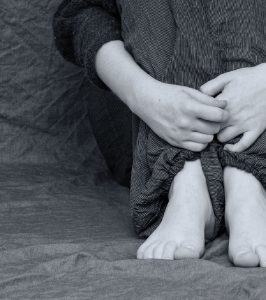[:en]

Fifth Sunday of Lent
Reflection
Conversion of the Heart
Fifth Sunday of Lent
Isaiah 43:16-21
Thus says the LORD, who opens a way in the sea and a path in the mighty waters, who leads out chariots and horsemen, a powerful army, till they lie prostrate together, never to rise, snuffed out and quenched like a wick. Remember not the events of the past, the things of long ago consider not; see, I am doing something new! Now it springs forth, do you not perceive it? In the desert I make a way, in the wasteland, rivers. Wild beasts honor me, jackals and ostriches, for I put water in the desert and rivers in the wasteland for my chosen people to drink, the people whom I formed for myself, that they might announce my praise.
Philippians 3:8-14
Brothers and sisters: I consider everything as a loss because of the supreme good of knowing Christ Jesus my Lord. For his sake I have accepted the loss of all things and I consider them so much rubbish, that I may gain Christ and be found in him, not having any righteousness of my own based on the law but that which comes through faith in Christ, the righteousness from God, depending on faith to know him and the power of his resurrection and the sharing of his sufferings by being conformed to his death, if somehow I may attain the resurrection from the dead. It is not that I have already taken hold of it or have already attained perfect maturity, but I continue my pursuit in hope that I may possess it, since I have indeed been taken possession of by Christ Jesus. Brothers and sisters, I for my part do not consider myself to have taken possession. Just one thing: forgetting what lies behind but straining forward to what lies ahead, I continue my pursuit toward the goal, the prize of God’s upward calling, in Christ Jesus.
John 8:1-11
Jesus went to the Mount of Olives. But early in the morning he arrived again in the temple area, and all the people started coming to him, and he sat down and taught them. Then the scribes and the Pharisees brought a woman who had been caught in adultery and made her stand in the middle. They said to him, “Teacher, this woman was caught in the very act of committing adultery. Now in the law, Moses commanded us to stone such women. So what do you say?” They said this to test him, so that they could have some charge to bring against him. Jesus bent down and began to write on the ground with his finger. But when they continued asking him, he straightened up and said to them, “Let the one among you who is without sin be the first to throw a stone at her.” Again he bent down and wrote on the ground. And in response, they went away one by one, beginning with the elders. So he was left alone with the woman before him. Then Jesus straightened up and said to her, “Woman, where are they? Has no one condemned you?” She replied, “No one, sir.” Then Jesus said, “Neither do I condemn you. Go, and from now on do not sin any more.”
Susanna Mak
 “The Lord has done great things for us, and we rejoice”, the Psalmist boldly proclaims (Ps 126:3). Indeed, we have been richly blessed with God’s love and mercy. During the past four Sundays of Lent, we have been reminded of the unfathomable depth and width of God’s love and mercy, and are called to repent and believe in the Gospel. God has promised us a new beginning, “I am about to do a new thing; […] do you not perceive it” (Is 43:19)? From the water that destroys the entire army of Pharaoh in the OT to the living water that cleanses, quenches thirst, and gives life in the NT, God continues to reveal His salvific plan to humanity (Ref. Is 43:16-21, Jn 4:13-14). In the first reading, Isaiah reaffirms the faithfulness of God: God has “extinguished” the Pharaoh’s army and will “make a way in the wilderness and rivers in the desert” (Is 43:17, 19). Similarly, God has the power to transform the arid landscape of our hearts into lush and fertile grounds.
“The Lord has done great things for us, and we rejoice”, the Psalmist boldly proclaims (Ps 126:3). Indeed, we have been richly blessed with God’s love and mercy. During the past four Sundays of Lent, we have been reminded of the unfathomable depth and width of God’s love and mercy, and are called to repent and believe in the Gospel. God has promised us a new beginning, “I am about to do a new thing; […] do you not perceive it” (Is 43:19)? From the water that destroys the entire army of Pharaoh in the OT to the living water that cleanses, quenches thirst, and gives life in the NT, God continues to reveal His salvific plan to humanity (Ref. Is 43:16-21, Jn 4:13-14). In the first reading, Isaiah reaffirms the faithfulness of God: God has “extinguished” the Pharaoh’s army and will “make a way in the wilderness and rivers in the desert” (Is 43:17, 19). Similarly, God has the power to transform the arid landscape of our hearts into lush and fertile grounds.
In this week’s Gospel, Jesus is, once again, tested by the scribes and Pharisees. They brandish the Law of Moses, like a lethal weapon, that “commanded [them] to stone” the woman who has been caught in adultery (Jn 8:5). Jesus gently avoids such trap by challenging their hypocrisy, “Let anyone among you who is without sin be the first to throw a stone at her” (Jn 8:7). When everyone has left without throwing a single stone, Jesus does not condemn the woman but urges her “from now on do not sin again” (Jn 8:11). Jesus has not only shown mercy to the sinner but more importantly, he has demonstrated that our sins cannot be blotted out by the letter of the law but only by God’s mercy. Further, true conversion of the heart is rooted in faith. St. Paul explains that we may “gain Christ” not through “righteousness of [our] own that comes from the law but one that comes from faith in Christ, the righteousness from God based on faith” (Ph 3:9). Indeed, Jesus comes not to negate or abolish the Old Law – the Law of Moses: The Ten Commandments – but to fulfill it (ref. CCC 1962). “The Law of the Gospel “fulfills,” refines, surpasses, and leads the Old Law to its perfection” (CCC 1967). This new law, “The Law of the Gospel […] does not add new external precepts, but proceeds to reform the heart, the root of human acts, […] where faith, hope, and charity are formed and with them the other virtues” (CCC 1968).
Ultimately, Jesus has done way more for this woman by showing her that true freedom from sin is rooted in the conversion of the heart. Henri Nouwen explains, “That is what conversion is all about. It is a complete turnaround that allows us to discover that we are not the prisoners we think we are. […] We worry about many things and even wound ourselves while worrying. God says: ‘Turn around, set your heart on my kingdom. I give you all the freedom you desire’” (Nouwen 54). When Jesus tells the woman not to sin again, He has not only lifted the burden of sin from her but also shown her a way towards genuine freedom and a new beginning. This story, like so many other stories in the Bible, calls us to turn to God without reservation.
As we journey along the last stretch of Lent towards the climax of God’s salvific plan, Christ’s death and resurrection, let us pray for courage to stay faithful and hopeful; keep “straining forward to what lies ahead” and “press on toward the goal for the prize of the heavenly call of God in Christ Jesus” (Ph 3:14).
Reference:
Nouwen, Henri. Here and Now: Living in the Spirit. New York: The Crossroad Publishing Company, 1994.
Susanna Mak
Susanna has a deep conviction that faith needs to be manifested in daily life, particularly, in one’s encounters with others as well as amidst dilemmas, choices, and challenges. She strives to be a living sign of God’s love and hope as a daughter, sister, friend, aunt, wife, teacher, chaplain, life-long learner, and occasional writer for FLL. She has been a high school teacher in Toronto for almost 20 years, with experiences in English and literacy, youth leadership initiatives, the Chaplaincy Team, to mention a few. She has a B. Comm, B.A. in English, and a B. Education from University of Toronto, an M.A. in Integrated Studies from Athabasca University, and a Graduate Certificate of Theological Studies from Regis College, U of T. She is humbled by the opportunity to be part of the FLL Writing Team.

聖枝主日 (丙年)
主日聖言及反省
「因上主之名而來的君王,應受讚頌!」(路 19:38)
聖枝主日
依撒意亞先知書 50:4-7
斐理伯書 2:6-11
路加所載主耶穌基督的受難始末 22:14-23:56
(我在這人身上,查不出什麼罪狀來。)
敘述:他們開始控告耶穌說:
群眾:「我們查得這個人,煽惑我們的民族,阻止給凱撒納稅,且自稱為默西亞、君王。」
敘述:比拉多於是問耶穌說:
比拉多:「你是猶太人的君王嗎?」
敘述:耶穌回答說:
耶穌:「你說的是。」
敘述:比拉多對司祭長及群眾說:
比拉多:「我在這人身上,查不出什麼罪狀來。」
敘述:他們越發堅持說:
群眾:「他在猶太全境,從加里肋亞起,直到這裡,施教,煽動民眾。」
敘述:比拉多聽了,就問耶穌是不是加里肋亞人。既知道他屬黑落德統治,就把他轉送到黑落德那裡。這幾天,黑落德也在耶路撒冷。
(黑落德及他的侍衛,鄙視耶穌,並譏笑他。)
敘述:黑落德見了耶穌,不勝歡喜,原來他早就想看看耶穌,因為他曾聽說過關於耶穌的事,也指望耶穌顯個奇蹟。
敘述:於是,黑落德問了耶穌許多事,但耶穌什麼都不回答。
司祭長及經師,站在那裡,極力控告耶穌。
黑落德及他的侍衛,鄙視耶穌,並譏笑他,又給他穿上華麗的長袍,把他解回比拉多那裡。
黑落德與比拉多,就在那一天,彼此成為了朋友;他們原先彼此有仇。
(比拉多把耶穌交出,讓他們隨意處理。)
敘述:比拉多召集司祭長、官吏及人民來,對他們說:
比拉多:「你們把這個人押來給我,好像他是一個煽惑民眾的人。看,我在你們面前審問了他,而你們控告他的罪狀,我在這人身上,並查不出一條來;而且,黑落德也沒有查出,因而又把他押回到我們這裡,足見他沒有做過該死的事。所以,我鞭打他以後,便釋放他。」
敘述:每逢節日,比拉多必照慣例,給他們釋放一個囚犯。但他們卻齊聲喊叫,說:
群眾:「除掉這個人,給我們釋放巴辣巴!」
敘述:巴辣巴原是因為在城中作亂殺人,而入獄的。
比拉多又向他們聲明,願意釋放耶穌。但他們卻不斷地喊叫,說:
群眾:「釘在十字架上,釘他在十字架上!」
敘述:比拉多第三次對他們說:
比拉多:「這人到底做了什麼惡事!我在他身上,查不出什麼該死的罪狀來。所以我懲罰他以後,便釋放他。」
敘述:但是,他們更大聲喊叫,要求釘耶穌在十字架上。
敘述:他們的喊聲越來越厲害。比拉多於是宣判:照他們所請求的執行,便釋放了他們所要求的、那個因作亂殺人而入獄的犯人;並把耶穌交出來,讓他們隨意處理。
(耶路撒冷女子!你們不要哭我。)
敘述:他們把耶穌帶走的時候,就抓住一個從田間來的基勒乃人西滿,把十字架放在他肩上,叫他在耶穌後面背著。
有許多人民及婦女,跟隨著耶穌。婦女搥胸痛哭耶穌;耶穌轉身向她們說:
耶穌:「耶路撒冷女子!你們不要哭我,但應哭你們自己,及你們的子女,因為日子將到,那時,人要說:那荒胎的,那沒有生產過的胎,和沒有哺養過的乳,是有福的。那時,人要開始對高山說:倒在我們身上吧!對丘陵說:蓋住我們吧!如果對於青綠的樹木,他們還這樣做,對於枯槁的樹木,又將怎樣呢?」
敘述:另有兩個凶犯,也被帶去,同耶穌一同受死。
(父啊!寬赦他們吧!他們不知道他們做的是什麼。)
敘述:他們既到了那名叫髑髏的地方,就在那裡,把耶穌釘在十字架上;也釘了那兩個凶犯:一個在右邊,一個在左邊。
耶穌說:
耶穌:「父啊!寬赦他們吧!因為他們不知道他們做的是什麼。」
敘述:他們拈鬮分了耶穌的衣服。
(這是猶太人的君王)
敘述:民眾站著觀望。首領們嗤笑說:
群眾:「別人,他救了;如果這人是天主的受傅者,被選者,就讓他救救他自己吧!」
敘述:兵士也戲弄耶穌,前來把醋遞給他,說:
兵士:「如果你是猶太人的君王,就救你自己吧!」
敘述:在他上頭,還有一塊用希臘、拉丁及希伯來文寫的罪狀牌:「這是猶太人的君王。」
(今天,你就要同我一起在樂園裡。)
敘述:懸掛著的凶犯中,有一個侮辱耶穌說:
凶犯:「你不是默西亞嗎?救救你自己和我們吧!」
敘述:另一個凶犯,應聲責斥他說:
凶犯:「你既然受著同樣的刑罰,連天主你都不怕嗎?我們罪有應得;我們所受的,正相稱於我們所做的;但是,這個人,從未做過什麼不正當的事。」
敘述:隨後,那凶犯又對耶穌說:
凶犯:「耶穌,當你來為王時,請你記得我!」
敘述:耶穌給他說:
耶穌:「我實在告訴你:今天,你就要同我一起在樂園裡。」
(父啊!我把我的靈魂交託在你手中。)
敘述:這時,大約已是第六時辰,遍地都昏黑了,直到第九時辰。太陽失去了光,聖所的帳幔,從中間裂開,耶穌大聲呼喊,說:
耶穌:「父啊!我把我的靈魂,交託在你手中。」
敘述:耶穌說完這話,便呼出了最後一口氣。
跪下默禱片刻
敘述:百夫長看見所發生的事,於是光榮天主說:
百夫長:「這人,實在是一個義人。」
敘述:所有來看熱鬧的群眾,見了這情形,都搥著胸膛,回去。
所有與耶穌相識的人,和那些由加里肋亞來跟隨耶穌的婦女,遠遠地站著觀看。——上主的話。
Shiu Lan

今天是聖枝主日,紀念耶穌榮進耶路撒冷,為聖週之開始。雖然耶穌幾番拒絕被立為王,衪選擇了時間,詳細地準備以默西亞的身份進城。被稱為帶來救恩的達味之子,耶穌坐着一隻從沒有被人騎過的小驢進入聖城,以象徵祂的王權。那一天,衪王國的子民是兒童和心謙的人,他們歡呼「因上主之名而來的君王,應受讚頌」。 今天,我們以同樣的字眼在感恩聖祭禮儀《歡呼歌》中來讚頌祂:「聖、聖、聖、上主、萬有的主,祢的光榮充滿天地。奉主名而來的,當受讚美。歡呼之聲,響徹雲霄」(賀三納Hosanna 的意思是「啊,請救我們吧」或「請給我們救恩」)(參考 天主教教理 559,570)。
在福音讀經中,我們聽到聖路加所載基督的受難始末。在這段經文中,最觸動我的是耶穌的清白。比拉多和黑落德二人都找不到耶穌任何罪證。「比拉多第三次對他們說:『這人到底作了什麼惡事?我在他身上查不出什麼應死的罪狀來』」( 路 23:22) 。同樣,黑落德也找不到任何罪證,他「鄙視他,戲笑他」 但「把他解回比拉多那裏」( 路 23:11) 。耶穌「斷了氣」後,「百夫長看見所發生的事,遂光榮天主說『這人,實在是一個義人』」( 路 23:46,47)。 所有同來看這景象的群眾,見了這些情形,都「搥着胸膛,回去了」( 路 23:48)。
耶穌雖知道為了罪人的叛逆要接受酷刑至死,但仍心甘情願地上耶路撒冷去 (天主教教理 569)。祂這樣做是為服從天父和愛我們罪人,祂「謙抑自下,服從至死,而且死在十字架上」(斐 2:8)。
教宗在四旬期文告中邀請今天的基督徒在個人、家庭和社交生活裏,更深刻和具體地去領悟逾越奧蹟。若我們跟隨這旅程,教宗說:「我們可以從天主為祂的受造物和為我們的計劃中,重新找到喜樂,就是愛衪,愛我們的兄弟姊妹,愛整個世界,並從這仁愛中,找到自己真正的快樂」。( 教宗方濟各四旬期文告 2019)。
我已準備好跟隨這旅程了,你準備好沒有?
Shiu Lan
Shiu Lan is your Catholic neighbour with a simple faith and likes praying the Rosary. With a B.Sc from the University of Hong Kong, she worked in Information Technology and Project Management before working with joy at home.

四旬期第五主日
主日圣言及反省
心灵的转变
四旬期第五主日
依撒意亚先知书 43:16-21
上主这样说:「他曾在海中开了一条路,在怒潮中辟了一条道;他曾使车、马、军队和将领,一同前来,沉没后,再未浮起,就此被消灭,像熄灭的灯心一样。「你们不必追念古代的事,也不必回忆过去的事!看哪!我要行一件新事,现在即要发生;你们不知道吗?看哪!我要在荒野中,开辟道路;在沙漠里,开掘河流。「田野间的走兽、豺狼和驼鸟,都要赞美我,因为我在旷野中,使水涌出,在沙漠里,使河流成渠,为把水赐给我所拣选的百姓喝:就是我为自己所造化的人民,好叫他们讲述我的荣耀。」
斐理伯书 3:8-14
弟兄姊妹们:我将一切都看作损失,因为我只以认识我主基督耶稣为至宝;为了他,我自愿损失一切,拿一切当废物,为赚得基督,为结合于他,为获得那出于天主,基于信德的正义;这正义并非因为我遵守法律,而获得的,而是由于信仰基督,而获得的。我只愿认识基督,及他复活的德能;参与他的苦难,相似他的死;我希望也得到由死者中的复活。这并不是说:我已经达到这目标,或已成为成全的人;我只顾向前跑,看看是否我也能够夺得,因为基督耶稣已夺得了我。弟兄们!我并不以为我已经夺得;我只顾一件事:即忘尽我背后的,只向在我前面的奔驰,为达到目标,为争取天主在基督耶稣内,召我向上争夺的奖品。——上主的话。
若望福音 8:1-11
那时候,耶稣上了橄榄山。清晨,他又来到圣殿;众百姓都来到他面前;他便坐下教训他们。那时,经师和法利塞人,带来了一个犯奸淫时,被捉住的妇人,叫她站在中间,便向耶稣说:「师父!这妇人是正在犯奸淫时,被捉住的。在法律上,梅瑟命令我们,该用石头砸死这样的妇人;可是,你说什么呢?」他们说这话,是要试探耶稣,好能控告他。耶稣却弯下身,用指头在地上画字。因为他们不断地追问,耶稣便站起身来,向他们说:「你们中间谁没有罪,先向她投石吧!」耶稣又弯下身,在地上写字。他们一听这话,就从年老的开始,到年幼的,一个一个地都溜走了,只留下耶稣一人,和站在那里的妇人。耶稣于是站起身来,向那妇人说:「妇人!他们在那里呢?没有人定你的罪吗?」那妇人说:「主!没有人。」耶稣向那妇人说:「我也不定你的罪;去吧!从今以后,不要再犯罪了!」
Susanna Mak
 《圣咏》作者大胆地宣告:「上主向我们行了伟大奇迹,我们的确也觉得满心欢喜」(咏126:3)。确实,天主一直赐给我们丰盛的仁爱和慈悲。在四旬期过去的四个主日,我们不断被提醒天主的爱和慈悲是何等的深厚和广濶,召唤我们悔改并相信福音。天主向我们应许了一个新的开始,「看哪!我要行一件新事;[…] 你们不知道吗」(依 43:19)?从旧约中使法老全军覆没的水,以至新约中能洁净、解除饥渴和带来生命的活水,天主不断向人类揭示祂的救赎计划(参 依 43:16-21,若 4:13-14)。在读经一,依撒意亚重申了天主的信实:天主「消灭」法老的军队,在「荒野中开辟道路,在沙漠里开掘河流」(依 43:17,19)。同样,天主亦有能力将我们干涸至龟裂的心灵转变成丰盛肥沃的土地。
《圣咏》作者大胆地宣告:「上主向我们行了伟大奇迹,我们的确也觉得满心欢喜」(咏126:3)。确实,天主一直赐给我们丰盛的仁爱和慈悲。在四旬期过去的四个主日,我们不断被提醒天主的爱和慈悲是何等的深厚和广濶,召唤我们悔改并相信福音。天主向我们应许了一个新的开始,「看哪!我要行一件新事;[…] 你们不知道吗」(依 43:19)?从旧约中使法老全军覆没的水,以至新约中能洁净、解除饥渴和带来生命的活水,天主不断向人类揭示祂的救赎计划(参 依 43:16-21,若 4:13-14)。在读经一,依撒意亚重申了天主的信实:天主「消灭」法老的军队,在「荒野中开辟道路,在沙漠里开掘河流」(依 43:17,19)。同样,天主亦有能力将我们干涸至龟裂的心灵转变成丰盛肥沃的土地。
本周的福音,耶稣再一次受到经师和法利塞人的挑战。他们挥舞着梅瑟律法书,像一把杀人利器,要「用石头」砸死在犯奸淫时被逮捕的妇人(若 8:5)。但耶稣却轻描淡写地以质疑他们的虚伪,来避开了这陷阱:「你们中间谁没有罪,先向她投石罢」(若8:7)。当没有人投出石头而离开时,耶稣并没有谴责这个女人,只是敦促她「从今以后,不要再犯罪了」(若 8:11)。耶稣不仅向罪人表示怜悯,更重要的是,他证明了我们所犯的罪,只能通过天主的慈悲,而不能通过律法的规条抹去。此外,心灵的真正转变植根于信德。圣保禄解释,我们能够「结合于祂」不是「借【我】因守法律获得的正义,而是借由于信仰基督获得的正义,即出于天主而本于信德的正义」(斐 3:9)。而实际上,耶稣来不是为否定或废除旧律法─梅瑟律法:十诫─而是要完成它(参见 天主教教理 1962)。福音的法律使旧约法律得以「完成」,净化、超越并达致完美。(天主教教理 1967)。这项新法律「福音的法律」并没有加添新的外在规范,却直接改造人类行为的根,就是改革人心【…】形成信、望、爱三德,并偕同此三德,修练其他的美德」(天主教教理 1968)。
最终,耶稣为这位妇女所做最重要的事情,是向她展示,真正脱离罪恶,获得自由,是植根于心灵的转变。 卢云神父解释:「这就是改变的意义。这是一个彻底的转变,我们以为自己是囚犯,但转变让我们发现我们不是。【…】我们担心很多事情,甚至担心至伤害自己。天主说:「转过身来,着眼于我的天国。我会给你所有你想要的自由」(Nouwen 54)。当耶稣告诉那妇人不要再犯罪时,祂不仅解除了她的罪恶枷锁,同时向她展示了真正的自由之路和一个新的开端。像圣经中许多其他故事一样,这个故事要求我们毫无保留地信靠天主。
现在是四旬期最后一段旅程,当我们步向天主救赎计划中的高潮─基督的圣死和复活时,让我们祈求天主赐给我们勇气,保持信德和盼望;继续「只向在我前面的奔驰」,「为达到目标,为争取天主在基督耶稣内召我向上争夺的奖品」(斐 3:14)。
参考
Nouwen, Henri 着 Here and Now: Living in the Spirit. New York: The Crossroad Publishing Company, 1994.
Susanna Mak
Susanna深信,信仰需要在日常生活中显露出来,尤其是当与别人相处时,需要分担对方所面对的困境、抉择和挑战。她有着很多不同的身份:女儿、姐姐、朋友、姨姨、妻子、老师、校牧、终身学习者和偶尔替《生命恩泉》写作的作者。在每一个身份当中, 她努力为天主的爱和希望作见证。 她在多伦多担任高中教师近二十年,拥有英语、学生读写能力、青年领袖活动、校牧组等经验。 她是多伦多大学商业和英语学士,教育学士,亚省Athabasca大学综合研究硕士,以及拥有多伦多大学Regis学院神学研究硕士证书。她对于成为《生命恩泉》写作团队的一份子, 深感荣幸。
